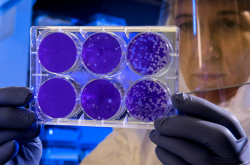Edible electronics cookies? Scientists report that they have developed a way to write graphene patterns onto virtually any surface including food. They say the new technique could lay the groundwork for the edible electronics capable of tracing the progression of foods from farm to table, as well as detecting harmful organisms that can cause gastric distress.
Aqueous storage device charges in 20 seconds. A new hybrid energy storage device can be charged in less than half a minute. It employs aqueous electrolytes instead of flammable organic solvents, so it is both environmentally friendly and safe. It also facilitates a boosting charge with high energy density, which makes it suitable for portable electronic devices.
AI sea slug much like a real thing. Scientists have built an artificially intelligent ocean predator that behaves a lot like the original flesh-and-blood organism on which it was modeled. The virtual creature, "Cyberslug," reacts to food and responds to members of its own kind much like the actual animal, the sea slug Pleurobranchaea californica, does. Researchers comment that their model acts much like a primitive ancestral brain and in the next step plan to add “more circuitry to get enhance sociality and cognition.”
A new way to combine soft materials. Researchers have developed a new method to chemically bond multiple soft materials independent of the manufacturing process. In principle, the method can be applied in any manufacturing processes, including but 3D printing and coating. This technique opens door to manufacturing more complex soft machines, from autonomous squishy robots to flexible wearables.
Social media use not that scary after all. Contrary to the popular assumption, researchers found that social media use has no significant negative effect on social interactions or social well-being.




